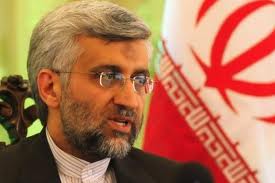 Iran said Saturday it has proposed a new round of talks on its nuclear program with six world powers that have been trying for years to persuade Tehran to freeze aspects of its atomic work that could provide a possible pathway to weapons production.
Iran said Saturday it has proposed a new round of talks on its nuclear program with six world powers that have been trying for years to persuade Tehran to freeze aspects of its atomic work that could provide a possible pathway to weapons production.
The country’s top nuclear negotiator, Saeed Jalili, said he has formally called on the United States, Russia, China, Britain, France and Germany to return to negotiations.
The invitation comes after new sanctions recently imposed by the West over Tehran’s enrichment of uranium, a process that produces fuel for reactors but which can also be used in making nuclear weapons. Iran insists it only has peaceful intentions, while the U.S. and many of its European allies suspect Iran of aiming to use a civilian nuclear energy program as a cover for developing a weapons capability.
The last round of negotiations between Iran and the five permanent members of the U.N. Security Council plus Germany was held in January in Istanbul, Turkey, but it ended in failure.
“We formally declared to them (the intent) to return to the path of dialogue for cooperation,” Jalili told Iranian diplomats in Tehran, according to the official IRNA news agency. Jalili did not say when or through what channel he issued the invitation.
Iran’s ambassador to Germany, Ali Reza Sheikh Attar, said earlier Saturday that Jalili was to send a letter soon to EU’s foreign policy chief Catherine Ashton to arrange a new round of talks.
A spokesman for Ashton said she had not yet received any new communication from Iran.
“As she has made clear in her statements on behalf of the (six nations), we continue to pursue our twin-track approach and are open for meaningful discussions on confidence-building measures, without preconditions from the Iranian side,” said the spokesman, Michael Mann.
The Iranian announcement was the latest signal from Tehran that the country is feeling the impact of international sanctions.
The U.N. has imposed four rounds of sanctions. Separately, the U.S. and the European Union have imposed their own tough economic and financial penalties.
Washington’s measures target exports of gasoline and other refined petroleum products to Iran and have banned U.S. banks from doing business with foreign banks that provide services to Iran’s Revolutionary Guard.
Last month, President Mahmoud Ahmadinejad acknowledged that the current penalties were impeding Iran’s financial institutions, saying, “our banks cannot make international transactions anymore.”
And earlier in December, Iran reinstated an offer for U.N. nuclear agency officials to visit Tehran, though it did not say whether the International Atomic Energy Agency would be able to focus on suspicions that Iran is secretly working on nuclear arms — a key condition set by the agency.
The U.S. and Israel have not ruled out a military strike against Iran’s nuclear facilities if Tehran doesn’t stop its nuclear program.
But Jalili warned Tehran would make any aggressor regret a decision to attack Iran.
“We will give a response that will make the aggressor regret any threat against the Islamic Republic of Iran,” Jalili said.
ABC/AP

Leave a Reply
You must be logged in to post a comment.